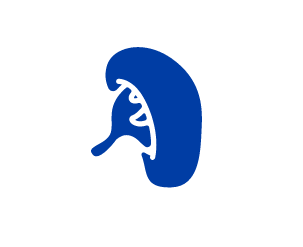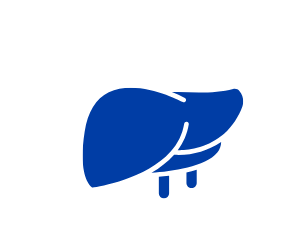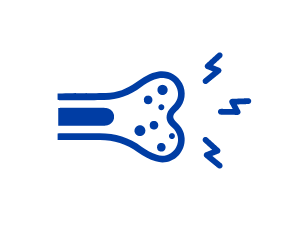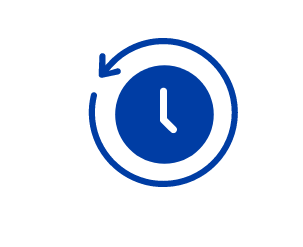Gaucher disease happens when a person has too little of the enzyme that breaks down the lipid glucosylceramide (gloo-ko-sil-SER-a-mide), also called GL-1. Not having enough of the enzyme causes GL-1 to build up in certain cells. These swollen cells are called Gaucher cells.
These cells with excess GL-1 can affect different systems throughout the body—mainly blood and organs such as the liver, spleen, and bones.
There are 3 types of Gaucher disease. More than 90% of Gaucher disease patients in the US have type 1.
Gaucher disease type 1 symptoms
Gaucher symptoms can appear similar to those of other diseases and can begin at any age. Some people have been told they have the wrong diagnosis or think they were already tested for Gaucher disease.
Liver and Spleen
- Enlarged spleen (splenomegaly) and enlarged liver (hepatomegaly) causing a bloated or bulging abdomen
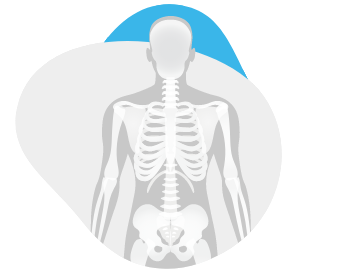
Bones
- Severe pain caused by lower blood flow to bones (bone pain and bone crisis)
- Bone marrow changes
- Loss of bone minerals (osteopenia and osteoporosis) can weaken the bones and may increase the risk for a bone to break
- Joint pain, arthritis, and joint damage
- Bone death (osteonecrosis)
Blood
- Lower amounts of blood-clotting cells (platelets), which make it harder for your blood to clot and may cause easy bruising or bleeding
- Lack of red blood cells (anemia), which may cause one to feel tired
Lungs
- Although uncommon, breathing (respiratory) problems
Talk to your doctor if you are experiencing any of these signs or symptoms, or if you have any questions about what they mean. Sanofi does not provide medical advice, diagnosis, or treatment. The health information contained herein is provided for general educational purposes only.
Onset of GD1 can occur at any age. GD1 advances differently for everyone and can be unpredictable. For some it may be very slow, with long periods of time when little or no symptoms are present. Others may experience sudden or worsening symptoms with no warning. Gaucher disease is a lifelong condition no matter how you experience your symptoms.

Gaucher disease type 1 can be effectively managed once a diagnosis is made.
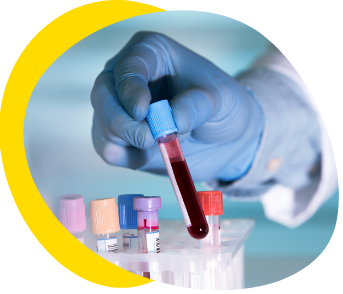
A blood test can confirm if you have Gaucher disease
A patient with GD1 may experience lengthy diagnostic delays. Genetic testing can confirm a diagnosis if the test reveals that a person has 2 copies of the affected Gaucher gene. Genetic testing can also be done to confirm if someone has 1 copy of the affected Gaucher gene (is a carrier).
Early diagnosis and timely treatment remain important, as damage caused by Gaucher disease type 1 may be irreversible.
GENETICS AND INHERITANCE
Gaucher inheritance
Gaucher disease is an inherited genetic disorder, which means the affected gene was passed down to you from your birth parents.
- There are many types of genetic disorders. Gaucher disease is called an autosomal recessive disorder
- Autosomal means that the affected gene is not on the chromosomes that determine sex, which means it can affect both males and females equally
- Recessive means that the genetic variant(s) must be passed down from both parents for you to have the disease
- A person with one copy of the affected gene is a carrier. Carriers do not develop the disease but can pass the affected gene on to their children
See the chances* of inheriting Gaucher disease based on birth parent status
-
When both parents are carriers, there is:
- A 50% (1 in 2) chance of a child also being a carrier
- A 25% (1 in 4) chance that a child will have Gaucher disease
- A 25% (1 in 4) chance that a child will be unaffected
When both parents are carriers, there is:
- A 50% (1 in 2) chance of a child also being a carrier
- A 25% (1 in 4) chance that a child will have Gaucher disease
- A 25% (1 in 4) chance that a child will be unaffected
-
When one parent is a carrier and one is unaffected, there is:
- A 50% (1 in 2) chance of a child also being a carrier
- A 50% (1 in 2) chance that a child will be unaffected
When one parent is a carrier and one is unaffected, there is:
- A 50% (1 in 2) chance of a child also being a carrier
- A 50% (1 in 2) chance that a child will be unaffected
-
When one parent has Gaucher disease and one is unaffected, there is:
- A 100% chance a child will be a carrier
When one parent has Gaucher disease and one is unaffected, there is:
- A 100% chance a child will be a carrier
-
When one parent has Gaucher disease and one is a carrier, there is:
- A 50% (1 in 2) chance a child will have Gaucher disease
- A 50% (1 in 2) chance a child will be carrier
When one parent has Gaucher disease and one is a carrier, there is:
- A 50% (1 in 2) chance a child will have Gaucher disease
- A 50% (1 in 2) chance a child will be carrier
*The probability of having a child with Gaucher disease type 1 does not change, no matter how many children the parents have.
†Affected: a person with Gaucher disease (they have 2 copies of the affected Gaucher gene).
‡Carrier: a person with only 1 copy of the affected Gaucher gene, and does not have any symptoms of Gaucher disease type 1.
Gaucher disease type 1 can affect individuals of any ethnicity
~1 in 40,000
Pan ethnic, occurs in ~1 in 40,000 in the general population
~1 in 850
Occurs in ~1 in 850 people of Ashkenazi Jewish heritage
~9 in 10
~9 in 10 Jewish Americans are of Ashkenazi Jewish heritage
~1 in 12
For individuals of Ashkenazi Jewish heritage, ~1 in 12 is a carrier of Gaucher disease
Your ethnicity alone can make you more likely to have Gaucher disease type 1. Talk with family members and those within your community about getting tested.
There are treatment options for Gaucher disease type 1.
Gaucher disease type 1 can be managed effectively with treatment.
Curious about how other patients are living with Gaucher disease type 1?
Hear from a real patient, Shauna, about her journey from symptoms to diagnosis to treatment.
Indication
CERDELGA is a prescription medicine used for the long-term treatment of Gaucher disease type 1 (GD1) in adults who are CYP2D6 extensive metabolizers (EMs), intermediate metabolizers (IMs), or poor metabolizers (PMs) as detected by an FDA-cleared test. Your doctor will perform a test to make sure that CERDELGA is right for you.
Limitations of Use:
- CYP2D6 ultra-rapid metabolizers may not achieve adequate concentrations of CERDELGA to achieve a therapeutic effect.
- A specific dose cannot be recommended for CYP2D6 indeterminate metabolizers.
Important Safety Information
Certain patients should not use CERDELGA based on their CYP2D6 metabolizer status due to an increased risk of side effects, including heart problems. Do not use CERDELGA if you are:
- An Extensive Metabolizer (EM) taking a medicine that is a strong or moderate CYP2D6 inhibitor along with another medicine that is a strong or moderate CYP3A inhibitor, an EM with moderate or severe liver problems, or an EM with mild liver problems and taking a medicine that is a strong or moderate CYP2D6 inhibitor.
- An Intermediate Metabolizer (IM) taking a medicine that is a strong or moderate CYP2D6 inhibitor along with another medicine that is a strong or moderate CYP3A inhibitor, an IM taking a medicine that is a strong CYP3A inhibitor, or an IM with any degree of liver problems.
- A Poor Metabolizer (PM) taking a medicine that is a strong CYP3A inhibitor, or a PM with any degree of liver problems.
Your doctor will perform a test to help determine if CERDELGA is right for you.
CERDELGA can affect the way other medicines work and other medicines can affect how CERDELGA works. Using CERDELGA with other medicines or herbal supplements may cause an increased risk of side effects, including changes in electrical activity of your heart (ECG changes) and irregular heart beat (arrhythmias). Especially tell your doctor if you take St. John's Wort, or medicines for fungal infections, tuberculosis, seizures, heart conditions, high blood pressure, or depression or other mental health problems. Your doctor may need to prescribe a different medicine, change your dose of other medicines, or change your dose of CERDELGA. Tell your doctor about all of the medicines you take, including prescription and over-the-counter medicines, vitamins, and herbal supplements before you start taking them.
Before taking CERDELGA, tell your doctor about all of your medical conditions, including heart problems (including a condition called long QT syndrome), a history of heart attack, kidney or liver problems. If you are pregnant or plan to become pregnant or breastfeed, talk to your doctor. It is not known if CERDELGA will harm your unborn baby. Talk to your doctor if you are breastfeeding or planning to breastfeed. It is not known if CERDELGA passes into your breast milk. You and your doctor will decide if you should take CERDELGA or breastfeed. You should not do both.
CERDELGA, used with certain other medicines, may cause changes in the electrical activity of your heart (ECG changes) and irregular heart beat (arrhythmias). Tell your doctor if you have new symptoms such as palpitations, fainting, or dizziness.
The most common side effects (≥10%) of CERDELGA include: tiredness, headache, nausea, diarrhea, back pain, pain in extremities, and upper abdominal pain. Call your doctor for medical advice about adverse effects.
Tell your doctor if you have any side effect that bothers you or that does not go away. These are not all the possible side effects of CERDELGA. Call your doctor for medical advice about side effects.
It is not known if CERDELGA is safe and effective in children.
Please see the full Prescribing Information, including the Patient Medication Guide, for CERDELGA.
Indication
CERDELGA is a prescription medicine used for the long-term treatment of Gaucher disease type 1 (GD1) in adults who are CYP2D6 extensive metabolizers (EMs), intermediate metabolizers (IMs), or poor metabolizers (PMs) as detected by an FDA-cleared test. Your doctor will perform a test to make sure that CERDELGA is right for you.
Limitations of Use:
- CYP2D6 ultra-rapid metabolizers may not achieve adequate concentrations of CERDELGA to achieve a therapeutic effect.
- A specific dose cannot be recommended for CYP2D6 indeterminate metabolizers.
Important Safety Information
Certain patients should not use CERDELGA based on their CYP2D6 metabolizer status due to an increased risk of side effects, including heart problems. Do not use CERDELGA if you are:
- An Extensive Metabolizer (EM) taking a medicine that is a strong or moderate CYP2D6 inhibitor along with another medicine that is a strong or moderate CYP3A inhibitor, an EM with moderate or severe liver problems, or an EM with mild liver problems and taking a medicine that is a strong or moderate CYP2D6 inhibitor.
- An Intermediate Metabolizer (IM) taking a medicine that is a strong or moderate CYP2D6 inhibitor along with another medicine that is a strong or moderate CYP3A inhibitor, an IM taking a medicine that is a strong CYP3A inhibitor, or an IM with any degree of liver problems.
- A Poor Metabolizer (PM) taking a medicine that is a strong CYP3A inhibitor, or a PM with any degree of liver problems.
Your doctor will perform a test to help determine if CERDELGA is right for you.
CERDELGA can affect the way other medicines work and other medicines can affect how CERDELGA works. Using CERDELGA with other medicines or herbal supplements may cause an increased risk of side effects, including changes in electrical activity of your heart (ECG changes) and irregular heart beat (arrhythmias). Especially tell your doctor if you take St. John's Wort, or medicines for fungal infections, tuberculosis, seizures, heart conditions, high blood pressure, or depression or other mental health problems. Your doctor may need to prescribe a different medicine, change your dose of other medicines, or change your dose of CERDELGA. Tell your doctor about all of the medicines you take, including prescription and over-the-counter medicines, vitamins, and herbal supplements before you start taking them.
Before taking CERDELGA, tell your doctor about all of your medical conditions, including heart problems (including a condition called long QT syndrome), a history of heart attack, kidney or liver problems. If you are pregnant or plan to become pregnant or breastfeed, talk to your doctor. It is not known if CERDELGA will harm your unborn baby. Talk to your doctor if you are breastfeeding or planning to breastfeed. It is not known if CERDELGA passes into your breast milk. You and your doctor will decide if you should take CERDELGA or breastfeed. You should not do both.
CERDELGA, used with certain other medicines, may cause changes in the electrical activity of your heart (ECG changes) and irregular heart beat (arrhythmias). Tell your doctor if you have new symptoms such as palpitations, fainting, or dizziness.
The most common side effects (≥10%) of CERDELGA include: tiredness, headache, nausea, diarrhea, back pain, pain in extremities, and upper abdominal pain. Call your doctor for medical advice about adverse effects.
Tell your doctor if you have any side effect that bothers you or that does not go away. These are not all the possible side effects of CERDELGA. Call your doctor for medical advice about side effects.
It is not known if CERDELGA is safe and effective in children.
Please see the full Prescribing Information, including the Patient Medication Guide, for CERDELGA.


